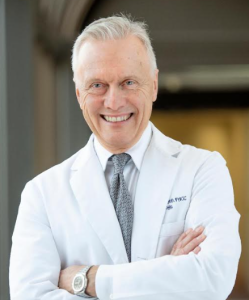By Keisa Sharpe-Jefferson
The Birmingham Times
Doctors at Ascension St. Vincent’s are continuing to enroll patients for an international clinical trial introducing a new anticoagulant — medication that decreases your blood’s ability to clot — in the treatment of atrial fibrillation (AFib).
The medication is for patients who cannot otherwise take blood thinner and is in the third phase of the international trial. St. Vincent’s is the only site in Birmingham conducting it and one of only two sites in Alabama with the other in Mobile. They are still enrolling patients and will stay with them for five years of this study.
Participants in the trial in Birmingham are part of a larger group of 1,900 patients participating in Asia, Europe, Latin America and North America.
AFib is an irregular heart rhythm that begins in your heart’s upper chambers (atria) and symptoms can include fatigue, heart palpitations, trouble breathing and dizziness.

Dr. Alain Bouchard, cardiologist at Cardiology Specialists of Birmingham and principal investigator for the trial said the study is important because Afib is increasingly “prevalent.”
The effects of AFib are simple, he said. “Patients have these palpitations [with AFib], because the heart is not well coordinated… It’s erratic and sometimes it can beat very fast. Most patients will feel their heart racing or feel their heart skipping.”
And that’s not all. Not only can it lead to blood clots in the heart, there’s increased risk of stroke, heart failure and other complications, he said.
“We’re talking about a condition that as the population continues to age, the prevalence continues to increase,” he continued. “Currently, we have almost six million people with a problem with AFib and it’s projected to be 12 million by 2030.”
“It’s a very common condition with a lot of consequences and the number one consequence is stroke. If you have AFib, it increases your risk of stroke five times compared to the normal population.”
Some AFib patients have no symptoms. Others experience, either intermittently or persistently, increased heart rates, shortness of breath or light-headedness. The condition isn’t life-threatening, but doctors strongly urge patients to seek medical attention to prevent more health problems.
While traditional anticoagulants are administered orally, approved participants in the 18-month study, who make monthly clinic visits, are administered the new trial drug – Abelacimab – via injection.
Doctors hope Abelacimab – will suppress a protein in the blood called Factor XI (Factor Eleven) while it could help patients gain protection against a stroke with less chance of bleeding. Research is still ongoing, but so far, scientists say the results are promising in trial participants.
Participating in the study
Trial participants are chosen after completing initial assessments, are 65 or older and are not currently being treated with an oral anticoagulant either by personal choice or at the recommendation of their doctor.
Results are monitored in two groups, Bouchard said.
“We give a monthly injection under the skin. One group will receive the medication (Abelacimab) and the other group will receive a placebo. We will monitor the patients very carefully on a monthly basis to see if the treated group will have less strokes.”
Measuring effective treatment
Some traditional lines of treatment have had minimal effect on preventing stroke, said the cardiologist.
“For patients with AFib, aspirin has a minimal role in the prevention of stroke. And if you have hypertension and diabetes and you have AFib, aspirin would not lower your stroke risk.”
But, Dr. Bouchard said current medications have shown more promise. “The new anticoagulants like Eliquis and Xarelto could reduce your risk of stroke to less than one percent, so this is quite significant.”
The study involving the new AFib medication will continue to grow as research coordinators plan to enroll 15,000 patients worldwide.
As promising as the results from phase 2 of the clinical trial have been, Bouchard said they are continuing to enroll patients in this large, multicenter, phase 3 clinical study and hope to complete it within the next two years.
To learn more about AFib, visit https://myheart.net/.
To learn more about the study or to participate, call 205-212-6031 (office) or 205-677-5218 (24-hour line).





